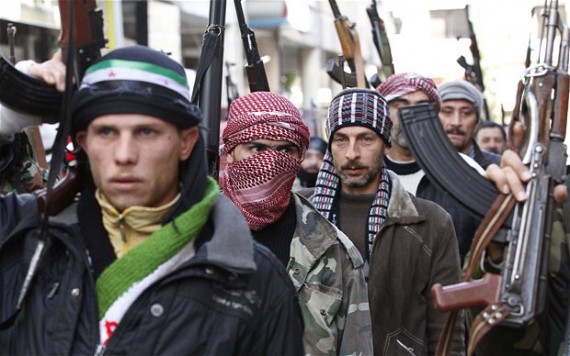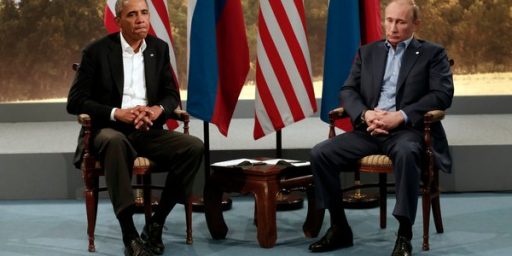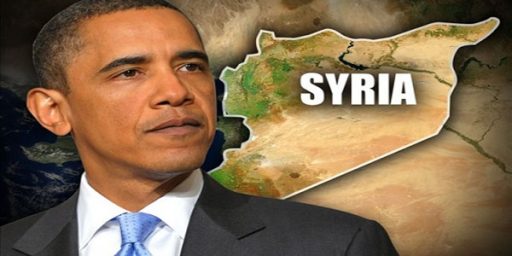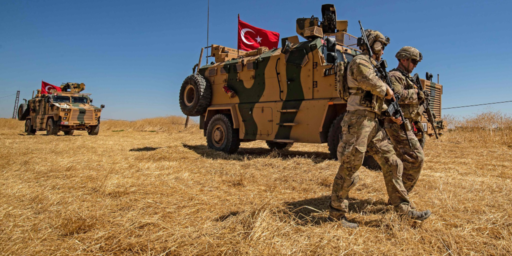Syrian Rebels Today, Syrian Taliban Tomorrow
Radical Islamists now dominate the Syrian opposition. And you're arming them.
Radical Islamists now dominate the Syrian opposition. And you’re arming them.
Reuters (“Syria’s Islamists seize control as moderates dither“):
During a 10-day journey through rebel-held territory in Syria, Reuters journalists found that radical Islamist units are sidelining more moderate groups that do not share the Islamists’ goal of establishing a supreme religious leadership in the country.
The moderates, often underfunded, fragmented and chaotic, appear no match for Islamist units, which include fighters from organizations designated “terrorist” by the United States.
The Islamist ascendancy has amplified the sectarian nature of the war between Sunni Muslim rebels and the Shi’ite supporters of Assad. It also presents a barrier to the original democratic aims of the revolt and calls into question whether the United States, which announced practical support for the rebels last week, can ensure supplies of weapons go only to groups friendly to the West.
World powers fear weapons could reach hardline Islamist groups that wish to create an Islamic mini-state within a crescent of rebel-held territory from the Mediterranean in the west to the desert border with Iraq.
That prospect is also alarming for many in Syria, from minority Christians, Alawites and Shi’ites to tolerant Sunni Muslims, who are concerned that this alliance would try to impose Taliban-style rule.
This line from the report is sobering: “Many pledge allegiance to the notion of a unified Free Syrian Army (FSA). But on the ground there is little evidence to suggest the FSA actually exists as a body at all.”
Like money, weapons are fungible. It really doesn’t matter if American arms “fall into the hands” of the worst elements, although they surely will. The bottom line is that the United States is now actively on the side of the anti-Assad forces and that, if the anti-Assad forces prevail, the worst elements will almost certainly govern Syria. Indeed, they’re already governing parts of it:
The Islamists are more energetic and better organized. The main two hardline groups to emerge in Syria are Ahrar al-Sham and Jabhat al-Nusra, an al Qaeda offshoot that has claimed responsibility for dozens of suicide bombings, including several in Damascus in which civilians were killed.
But Islamist fighters, dressed in black cotton with long Sunni-style beards, have developed a reputation for being principled. Dozens of residents living in areas of rebel-held territory across northern Syria told Reuters the same thing, whether they agreed with the politics of Jabhat al-Nusra or not: the Islamists do not steal.
Aaron Zelin, a fellow at the Washington Institute for Near East Policy who researches Islamic militants, said the main reason groups such as Jabhat al-Nusra and Ahrar al-Sham have become popular is because of the social provisions they supply. “They are fair arbiters and not corrupt.”
In Aleppo four Islamist brigades, including Jabhat al-Nusra and Ahrar al-Sham, have taken over the role of government and are providing civilians with day-to-day necessities. They have also created a court based on Islamic religious laws, or sharia.
The Aleppans call it “the Authority” and it governs anything from crimes of murder and rape to business disputes and distributing bread and water around the city. The power of such courts is growing, Authority members and rebels said, and is enforced by a body called the “Revolutionary Military Police.”
At the police’s headquarters, a five-storey building surrounded with sandbags, a large placard outside read: “Syrian Islamic Liberation Front.” It referred to a union of several Islamist brigades, forged in October 2012, which seeks to bring together disparate fighting groups. Its Islamist emphasis has already alienated some other fighters.
All of this was predictable and predicted.







I don’t like the thought of arming them, either, but if they govern as the “fair arbiters” they’re currently perceived to be, and keep to themselves (i. e. do not fund or export terrorism), I don’t see a problem. Indeed, that would probably be the best possible outcome.
But how often do these things ever lead to the best possible outcome? I’m thinking just about…never.
@Mikey:
And please provide the evidence you have to think that this is even a remote possibility
@Doug Mataconis: Hence my closing sentence.
There is no reason to prefer the Syrian resistance to overthrow Assad more than for Assad to keep power. Intervening in Syria fails both Just War theory and realpolitik. See here why.
I’m still waiting to see the background checks that our govwernment will impose on the Syrians before giving them weapons.
Yep. We really should just give this thing a pass.
Let’s see… Obama wimped out on backing the Iranian protesters, then put the US behind the rebels in Egypt and Libya. Just because he’s 0-3 doesn’t mean that he’s wrong this time, does it?
Yes, which is one of the reasons some of us advocated for early and direct intervention. By waiting, we allowed a power vacuum to develop and grow, which the Islamists inevitably filled. We were always going to get involved in Syria eventually. Islamists were always going to do so as well. What we have now – incrementally increasing involvement only after the Islamist forces are already entrenched – is the “predictable and predicted” result of the anti-intervention political pressure that has caused us to wait too long and do too little.
I’m afraid I’m going to have to inject a bit of nuance. First of all, Sunni Islamist does not always=Jihadist. The Gulf States are all Sunni Islamist regimes, by any measure, but they are all US allies.Indeed, IIRC, Dr. Joyner (and the USA) went to war to restore one of those Islamist regimes after it was overrun by a “secular” regime.
What this means is that there is no simple algorithm whereby Sunni Islamist=Al-Queda. World’s more complex than that.Two of the brigades in the FSA are Al-queda related. Arithmetic tells you that some of them are not. The article also speaks of poorly organized moderate groups. Well, maybe we can organize and arm the moderates.I presume the CIA and Special OPs are a bit better about figuring these things than they were in the 1980s.
Seems to me the problem here is that Islamists were organized and received outside help, whereas the West left the moderates to fend for themselves and hoped that they would spontaneously self-organize.One side planned and the other hoped.
The article does indicate that the West and moderates are way behind the Islamists and will have to work hard to catch up. But it isn’t quite the counsel of despair that James suggests.
@R.Dave: It’s certainly a harder problem now than two years ago. But it may well have been too hard, then, too.
@stonetools: The problem is that there just aren’t that many moderates and they’re disjointed and mostly not living in Syria.
Interfering in Iranian internal affairs has always worked out so well in the past, we should absolutely go down that road again…
Not being able to support Mubarek’s torture chambers is a blow to some in the US, no doubt.
@stonetools:
Additionally, there’s the problem that neither side at this point has a clear line to victory. Which means that, to some degree, all our weapons will be doing is drawing out a conflict. The longer those conditions last, the more that (a) the internal infrastructure of the country is destroyed and (b) the more radical elements rise to the top of each side.
Taking steps back, Syria looks more and more like the proxy war that Afghanistan was (though in this case instead of the Soviets, we’re actually proxy-engaging with Hezbollah and Iran).
Essentially its creating the conditions for a power vacuum very similiar to the situation that brought the Taliban to power. Is Syria a perfect match for Afghanistan? No.
But given how badly nation building in both Afghanistan and Iraq have backfired, I think we need to be exceedingly cautious about any efforts to bring about regime change anywhere (regardless about the perceived successes in Libya or elsewhere).
@R.Dave:
Why is this taken as a given?
Did we get involved, in, for example Rwanda?
This is a serious question, why is it assumed that we “were always going to get involved.”
@James Joyner:
Well, hard isn’t impossible. People forget , but the experts in 1776 thought the American rebels had no chance, too .We should remember that moderates initially led the revolt. Maybe with outside help, they can again.
@stonetools:
That’s a pretty ahistoric reading that is idealistic at best. It also tends to miss the significant differences that are on the ground (most importantly major geographic ones) and the fact that this isn’t the overthrow of a colonial government/occupying force… this is a civil war.
@Matt Bernius:
Oh I don’t take it as a given that we’re always going to get involved everywhere. I just think that a civil war in Syria specifically isn’t something we can avoid getting dragged into one way or another given (i) its proximity and relevance to Israel, (ii) its links to Iran and Lebanon, (iii) its terrorist connections, (iv) its WMD stockpiles, (v) the general state of the Middle East in the aftermath of Iraq, Libya and the Arab Spring and (vi) the brutality of Assad coupled with our memory of and arguable culpability for allowing Hussein’s crackdown on Shiites and Kurds after the Gulf War.
@Matt Bernius:
A major problem in the OTB discussion is this insistence that the Administration goal is for rebel “victory”. Now “Victory” has not been mentioned in any Obama Administration statement to date. Is there a possibility that we could discuss what the Administration’s STATED goals are?
At the initial press conference, the Obama Administration spokesman Rhodes said:
Get it? The goal isn’t “victory” or “unconditional surrender” a la WW2 , of sainted memory, but a political settlement.
Obama in an interview:
What does all this mean? It means that Mission Accomplished is not the rebels marching into Damascus but Assad deciding to sit down in Geneva and negotiating a power-sharing agreement with the rebels. Right now, since he’s winning, he has no incentive to talk. Arming and organizing rebels is meant to change that. That’s a much less ambitious goal than “Victory!”
@Matt Bernius:
Actually, the American Revolution was kind of a civil war, too-a civil war that was won when a major outside power-France-supported the rebels. Now that’s now how Disney World remembers it- but that’s how it was.
A functional power sharing arrangement between the factions (think Lebanon and Iraq but pretend it works there) is ISTM a superior outcome to either the islamists or Assad in Damascus.
@R.Dave:
One of the problems with people who are convinced that we can avoid intervention in Syria is that they don’t look at maps. Its like saying that we don’t need to get involved in a Panamanian civil war, because Panama doesn’t have anything we need. Sure, that’s true in abstract- but the Panama Canal dictates that we would get involved.
Syria is the land bridge between the oil rich areas of the Middle East and the Mediterranean. The ancient trade-and invasion-routes that link Iran, Turkey, and Mesopotamia to Egypt and Africa all run through Syria.(Fun Biblical fact-every single time a northern power invaded Israel, they came through Syria). Even if everything you mentioned weren’t true -and they are all true-Syria would be strategically significant.
And then there is the refuge problem….
@R.Dave: Yes, which is one of the reasons some of us advocated for early and direct intervention.
I believe the traditional response to such statements is “then feel free to go fight in Syria.”
I personally didn’t care for that argument, but I’ll bow to the local customs of the leftists here in this case…
@rudderpedals:
Here is an article describing what such an agreement might look like:
We are a LOOOOOOOOOONG way from such an agreement- but this is a possible roadmap.
@rudderpedals:
Well, I’d be a lot more hopeful if we didn’t have to pretend it works elsewhere…
@stonetools:
Until a recent thread, this discussion has been about Assad being removed from power, a democratic government being established, the new government being run by moderates, and the impact of Assad staying in power.
President Obama has had no specific goals. He has vague goals at best. The only concrete statements were about WMD use crossing a red line, and the consequences would be a change in calculus. Apparently, the new calculus is a political settlement. I have no idea of what any of this is means. I suspect it is intended to mean whatever one thinks it means.
Personally, I do not care. If President Obama is not going to fully and competently engage militarily in Syria (or anywhere else), he should remain as vague and non-committed as possible, and he has earned an A+. If he sends a few rifles and body armor to shut up the interventionists, he will drop down to an A.
This is my opinion, and I do not intend to get dragged into a partisan debate over President Obama’s foreign policy performance. NOTE: @stonetools, your arguments have not been political, and this is not directed at you.
@stonetools: Good find. Remaining alive in Damascus and presumptively in complete control of foreign policy and the military seem to be his big things. It’s a start.
@Mikey: Indeed. Maybe the thought is that doing the very least we could do keeps a path open to the best case?
@TastyBits:
A political settlement was the stated goal from day one. But why read, let alone discuss, the Administration’s stated goal when you can create straw men to demolish and denounce?
Here’s some homework for folks: the transcript of Obama’s interview with Charlie Rose.
As you can see, there’s no mention of rebel “victory,” indiscriminately showering arms on jihadists, sending in troops, or any of the things people are insisting that he is about to do.
@stonetools:
This discussion has been going on prior to Monday (June 17, 2013), and @stonetools has been in that discussion. I am not aware of this position prior to this date, and there has been no indication that this was your argument. You have not been arguing for a political solution, and you have rejected any solution that leaves Assad in power.
If you have now changed your mind, say so.
@TastyBits:
This was my post on June 5, on the “NATO Isn’t Going to Fight in Syria” thread:
That’s been my position all along, and its been the Administration position.Now a lot of folks here have mis-characterized my position and also that of the Obama Administration. Maybe that’s the reason for your confusion.
My long assessment of American intervention as it would relate to both Realpolitik and Just War Theory is here.
@Donald Sensing:
Since you don’t accept comments at your site, I’ll post a reaction to your piece on Realpolitik and JWT here.
I think that Syrian intervention fails to meet the standards of a just war for a reason you don’t mention in your post but involved in the requirement for a just ending to the war. Simply removing Assad without securing the safety of the Syrian people including Alawites from the rebels would not constitute a just ending to such a war. To do that we’d need to commit to a protracted period with American boots on the ground and, frankly, I don’t think that’s politically possible and certainly not what the administration has in mind.
There’s another, more technical reason. For a war to be just it must be declared under a just authority. An intervention in Syria with neither Security Council authorization, something that seems impossible in the face of Russian opposition, or Congressional authorization, which seems unlikely.
Venue shopping of the sort we’ve pursued in recent memory may be expedient and vaguely legal but it isn’t just.
@rudderpedals: Is our objective to prop up the rebels enough to maintain a stalemate that tires both sides out enough that they come to the negotiating table?
I fine strategy, except for the as-yet-unnumbered thousands of Syrians who will die in the meantime.
@Dave Schuler:
Excellent points, thanks! However, I take exception to this statement (fragment) of yours about authorization by proper authority: “An intervention in Syria with neither Security Council authorization … .”
The UNSC is not proper authority for the employment of US forces. In fact, the UNSC and its resolutions are altogether irrelevant in that regard. The US Congress is it, and that’s all.
UNSC supporting resolutions may make a military operation more politically sustainable, but not more legally so. Here’s why.
@Mikey:
Actually, Dan Drezner of Foreign Policy says that is exactly the case and says that Obama is engaging in cold Realpolitik and that the recently-announced plan to send arms to the rebels is the logical extension of it.
@Donald Sensing: Gah, that’s awful. But it’s the only explanation that makes sense of the limited scope of our intervention. We get to fight a proxy war without actually fighting. The Iranians are forced to expend more resources, the Russians get poked in the eye, we get a lot of effect with little cost…and the Syrians keep dying wholesale.
It doesn’t get much more “brutally realpolitik” than that.
@stonetools:
You have cited Libya as a model several times. To me, the Libya model means a dead/deposed Assad and a new government of the rebels. You do seem to bounce back and forth, but I can see where you included this as one of several possibilities.
I have addressed why Assad is going to be in power until the Russians decide it is time for him to go. If the goal is not to remove Assad, I fail to understand how this is advantageous. A negotiated settlement with Assad in power is a win for Assad, Russia, Hezbollah, and Iran.
@Mikey: @Donald Sensing:
First of all, thousands of Syrians are dying NOW. Many thousands more will die if Assad “settles accounts” after a total victory. There’s no magic solution that won’t involve thousands of Syrians dying. A negotiated settlement soon, though, will save the most.
Aiming for a negotiated settlement isn’t the same as the realpolitik option, although it can look superficially similar.
@Donald Sensing:
There are realpolitik strategic reasons for engaging in Syria. Note that both Iran and Russia see Iran as an important strategic asset. They aren’t going all in there for no reason. Obama’s view of our interests:
@Dave Schuler:
Indeed. What the Administration has in mind is a negotiated settlement that would leave Assad in place and with protections for all sides. Its a tough ask, but then better than any alternatives that don’t involve unicorns.
@TastyBits:
Please read the article I referenced above. It leaves Assad in power but as a President in a limited government with a constitution and a premier in charge of domestic affairs. That’s not lollipops and puppies for us, but its better than a total Assad victory.Russia and Iran would get less out of such a settlement, too.
@stonetools:
We’re not aiming for that, though, not soon. Obama’s lofty statements about our interests notwithstanding, our limited involvement (at least as it stands now) won’t do anything besides prolong the fighting.
For one thing, Iran and Russia aren’t just going to sit idly while we pump guns and money to the rebels. They’re going to want to tip the scales back to the regime’s favor. We of course have far more resources than either of them, but they are probably willing to commit far more than we are. So we end up in a game of escalation and counter-escalation.
Eventually, either we decide another step up is a step too far and we pull out and the regime (and Iran and Russia) prevails, or the Russians finally decide they don’t want to screw around any more and pull their support, the regime collapses, and we’re left holding the bag.
@stonetools:
I fail to understand why Assad is going to negotiate a settlement unless he is about to lose, and if he is about to lose, I fail to understand why the rebels are going to negotiate. A settlement negotiation that does not include Russian interests ain’t gonna happen, and one that does not include the principles is fantasy.
I take reality as it is not as I would like it.
@Mikey:
Sigh. Obama almost can’t win, because people want magic, quick fire solutions.
Of course, the initial involvement is going to be limited. He’s started with disorganized, small groups, which the CIA and Special ops units are going to have to organize into larger fighting formations under trained soldiers. That will take time.You then can bring in heavier weapons As he does this, rebel opposition will stiffen and Iran and Russia may decide to come to the table. What is the alternative? Assad rolls over the opposition, and slaughters or drives out hundreds of thousands of people?Would that be a better or less bloody result?
Non-interventionists are great at figuring out all the ways things can backfire, but one thing they are silent on is why doing nothing would be better. Their argument is pretty much:
1. Do Nothing
2……
3. Rainbows!
In reality, doing nothing has big downsides of its own, which non-interventionists refuse to admit. The question should be, How likely is it that doing nothing will produce a better outcome than doing something and pushing for a negotiated settlement? The Obama Administration has calculated-rightly, IMO-that continuing to do nothing would be worse. After all, its not like doing nothing hasn’t been tried. The Administration did nothing for two years-and things got steadily worse. There’s every reason to believe they’ll CONTINUE to get worse, in the absence of action by the US.
@TastyBits:
The reality is that Assad certainly will not negotiate a settlement now, when he is winning. He and his backers Russia and Iran may be willing to negotiate if the rebel groups do much better and if the cost of continuing the fight grows above what Russia and Iran is willing to pay. In the Russia-Afghan War, things did get to that stage and Russia pulled out.
And of course everyone needs to be at the table. Kerry has been calling for all party talks for months now. The problem is that Assad , Russia, and Iran don’t think they need to come. Appealing to their better nature hasn’t worked. The reality is that we need to give them an incentive.
@stonetools: Non-interventionists are great at figuring out all the ways things can backfire, but one thing they are silent on is why doing nothing would be better. Their argument is pretty much:
1. Do Nothing
2……
3. Rainbows!
Here’s this semi-conservative’s basic philosophy, that applies in all sorts of cases. Unless you have a reasonable assurance that taking action will actually improve things, then “doing nothing” is an entirely appropriate course of action. “This is bad, so we must do SOMETHING” is a very common instinct on the left, and one that I find utterly irresponsible. Especially since so many times it just makes things worse. But that’s OK, because at least the folks who made it worse had the best of intentions…
@stonetools:
The US has tried many variations on the intervention strategy, and all most all have been failures. The Banana Wars could be considered successful, but they were confined to the US’s “backyard”. Korean, Vietnam, Nicaragua, El Salvador, etc. were all failures. Arming the Afghanistan rebels helped drive out the Soviet Union, but that turned out to be a big failure. Grenada and Kuwait were successful, but the invaders were thrown out. Kosovo was a success, but there was only one global power at that time. The 2001 Afghanistan invasion was a success, and it has been followed by failure. The 2003 Iraq invasion was a success, and it was followed by failure.
I am sure I have left out a few, but the trend is the same. Of course, “it’s different this time,” or “the troops will be home by Christmas.” If it were easy, the US would have a string of successes.
I am not sure how to respond, but I am guessing that you are serious. This has been tried, and it did not work then. If you want to go this route, skip to the end and send the B-52’s on carpet bombing runs. In fantasyland, Nixon was able to coerce the North Vietnamese to negotiate a settlement, but in the real world, the US pulled out and Saigon fell.
An effective fighting force requires a lot of training and discipline. In the movies, the hero comes in, gives everybody a pep talk, and off they go to fight the enemy. In the real world, it is a little different.
@stonetools:
I’m not pushing for that, I’m asserting Obama doesn’t actually want a near-term solution. He wants to bleed Iran as long as possible.
That sounds exactly like the very early stages of the Vietnam war.
Doing nothing would be better because it wouldn’t lead to an inevitable game of escalation and counter-escalation that either ends with us deciding the next escalation is too far and pulling out, leading to embarrassment for us and an Assad/Iran/Russia victory, or Iran/Russia pulling out and leaving us as the de facto creators of a radical-Islamist-led Syria.
Right now, doing nothing basically means a return to the status quo ante (including the bloody reprisals for which the Assad regimes are known, unfortunately).
It may well be the plan of the Obama administration to simply bleed Iran for a while, because the limited nature of our involvement simply isn’t going to be enough to force Assad to negotiate.
Or, I could be as wrong as basketball cleats and we end up with the rainbows. It’s possible. But if history is any kind of teacher, we should assume it’s highly unlikely.